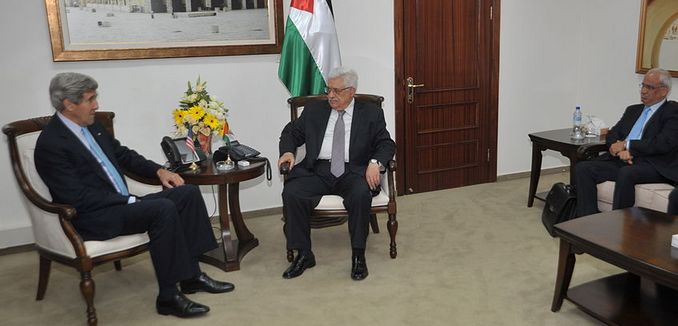A recent report by Jonathan D. Halevi for the Jersusalem Center for Public Affairs supports the suspicion that that the crisis in negotiations precipitated by Palestinian President Mahmoud Abbas to refuse any reasonable compromise with Israel was “a premeditated effort to participate in talks without the intention of compromising on any issue of significance to the U.S.–and thereby to reap the benefits of negotiating without allowing any deal to emerge.”
Halevi writes that the rationales for the Palestinian rejectionism were spelled out in a paper presented by chief Palestinian negotiator, Saeb Erekat in March 2014. These recommendations include:
submitting a request to immediately join the Geneva Conventions; declaring the impossibility of extending the negotiations after the end of the nine-month period on April 29, 2014; and opposing the Israeli proposal that the settlement blocs become part of Israel in any final agreement.
Subsequent to the breakdown in negotiatons, Abbas signed 15 treaties and conventions — though the Palestinian Authority was in violation of at least 11 of those conventions — as a means of boosting its recognition. Halevi explains further:
The legal logic of such a move might be found in Professor James R. Crawford’s The Creation of States in International Law. Crawford, who took part in the discussions at the International Court of Justice in The Hague over the legality of Israel’s security fence, describes how a state might emerge through an “accretion of powers in a local unit over a period of time” and not just through a declaration of independence. He cites Judge Sir Gerald Fitzmaurice, who wrote that the “concluding of a treaty may be part of a process (or even constitute the act) whereby the State not fully sui juris (possessing by itself legal standing) is becoming so.” In other words, the signing of the 15 international conventions, according to this logic, is part of a gradual Palestinian move to statehood which, unlike a unilateral declaration of statehood, does not occur with one move.
But the decision to pursue the path of internationalizing the conflict isn’t a recent one. Jonathan Schanzer of the Foundation for Defense of Democracies identifies it as being part of Abbas’s “Palestine 194” campaign (i.e. for Palestine to become the 194th nation represented in the United Nations) that he has been pursuing since 2005.
This initiative had been in the works, with fits and starts, since 2005. That year, Abbas reportedly traveled to Brazil for a summit of South American and Arab states, and met privately with Brazil’s leftist president, Luiz Inácio Lula da Silva. There, da Silva supposedly told Abbas that when he neared the end of his second term (which expired on January 1, 2011), he would help build a Latin American consensus for a unilateral Palestinian statehood declaration at the UN. …
The Palestinians, for their part, know that if they take new steps in this direction, it will open up a whole new front in the Palestinian-Israeli conflict. This explains, in part, why Palestinian officials have kept a lid on their strategy. However, Palestinian officials in the past have been quick to point out that they do not view the Palestine 194 campaign as antithetical to bilateral negotiations with Israel. Indeed, they see it as a means to enhance their negotiating position.
In fact the peace process was premised on the principle that “all outstanding issues relating to permanent status will be resolved through negotiations.” Abbas by seeking to internationalize the conflict is not simply enhancing his negotiating position, but is violating one of the understandings underlying the Israeli agreement to enter into negotiations with the PLO over 20 years ago.
[Photo: U. S. Department of State / WikiCommons ]




